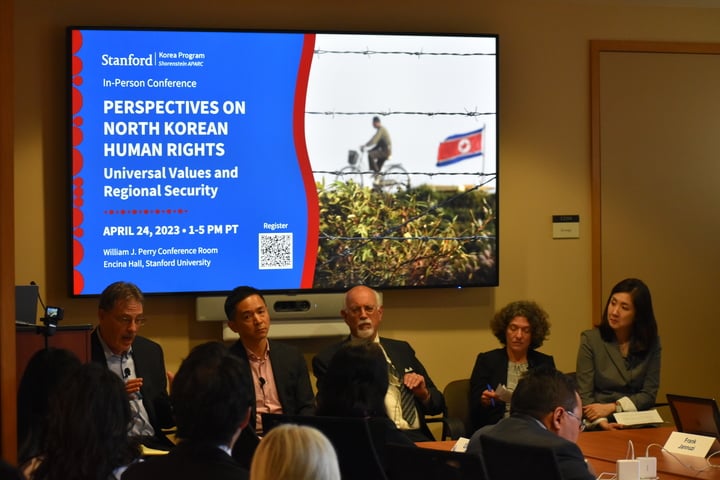On Monday, while President Joe Biden hosted South Korean President Yoon Suk Yeol to discuss nuclear threats from North Korea, the Walter H. Shorenstein Asia-Pacific Research Center (APARC) held a half-day conference, “Perspectives on North Korean Human Rights: Universal Values and Regional Security,” at Encina Hall. The conference brought together national security experts and international officials who criticized alleged human rights abuses in North Korea, from malnourishment of citizens to forced labor in prison camps, and called for the increased flow of information into the East Asian country.
This year marks the 10th anniversary since the United Nations Human Rights Council voted to create a Commission of Inquiry on Human Rights in North Korea. In her opening speech, Shin Hwa-Lee, ambassador-at-large of the Republic of Korea on international cooperation for North Korean human rights, argued that the value of human rights is universal in nature and that numerous human rights abuses were taking place in North Korea.
Elbegdorj Tsakhia, former president of Mongolia, was also present at the event. He recounted his visits to North Korea, which he described as “frozen in time.”
Tsakhia detailed conditions in labor camps in North Korea, such as Camp 16 Hwasong and Camp 22 Hoeryong (which had an estimated 50,000 prisoners at its peak). He said that these camps trap prisoners and their families in a forced labor system that has been deemed by the U.N. as a crime against humanity. Those who break the law are subject to deplorable conditions, Tsakhia said, and “family members [are] actually brought to detention centers.”
Tsakhia also criticized North Korea’s security force, which he said uses surveillance and intimidation tactics to instill fear. “If you are loyal to the regime, you will get everything: health, education, promotional post, everything recognized. If you are not loyal to the regime, you will lose everything,” Tsakhia said. “I think every aspect of a human family in North Korea, in a communist country, is weaponized.”
Andrew Natsios, executive professor at the Bush School of Government and Public Service at Texas A&M University, described interviews he conducted with North Korean escapees for his book, “The Great North Korean Famine.” Natsios said that he observed a lack of knowledge surrounding famine among the North Korean people that he interviewed, which he said he believes may have led to many preventable losses.
According to Natsios, some of the North Korean citizenry’s observed lack of knowledge about famine can be attributed to the North Koren government, which he said is adamant about vetoing and rejecting U.N. resolutions to keep the sensitive issues of food and food insecurity hidden.
Natsios said that he found citizens who were visibly malnourished were not allowed to leave their homes, which he said was indicative of the North Korean government’s sensitivity to its image to the outside world. “If they didn’t care, why do they go to such degrees to suppress information about conditions of human rights … in terms of acute malnutrition and sustained malnutrition?”
According to Natsios, sustained acute malnutrition among the populace for over 30 years has manifested in “the average North Korean soldier [being] on average 10 cm shorter than a South Korean soldier [as I observed during] my first trip to South Korea.” Unless borders can open up, Natsios added, “the country will literally starve to death.”
Larry Diamond, senior fellow at the Hoover Institution and Freeman Spogli Institute for International Studies, echoed the notion that North Korea’s closed territory and governance pose a challenge to bringing about changes in human rights.
“One thing that I think needs to happen is to try and change information understanding and consciousness among the people of North Korea and I realize this is the most closed regime in the world,” Diamond said. Diamond said that having a more porous border between China and North Korea would enable a flow of goods and ideas, which he said could help North Korean citizens become more informed.
Kiyoteru Tsutsui, director of the Japan Program at APARC also offered a condemnation of the North Korean regime’s approach to human rights. “If you go down the list of human rights in the Declaration of Human Rights, it’s hard to find a human right that is protected for regular North Korean citizens,” he said. He said that he is concerned that the issue of human rights in North Korea often received less coverage from human rights organizations than human rights abuses in other regions.
Frank Jannuzi, former deputy executive director for Amnesty International, said that the lack of coverage for human rights may be attributed to the lack of transparent data about human rights in North Korea, a country which has historically maintained tight borders. “Amnesty [International] has a very high industry standard when they publish and the lack of access to North Korea is the principal reason why Amnesty International has not written more,” he said.
The topic of denuclearization has also overshadowed efforts to address human rights concerns in discussions regarding North Korea, according to Tsutsui.
How can countries around the world address human rights abuses in North Korea? “It is a human rights violation to repatriate anyone who escaped North Korea,” Jannuzi argued. Jannuzi said that countries outside of North Korea are aware that punishment awaits North Koreans who are repatriated and argued that countries should avoid sending back escapees.
“One thing that I think needs to happen is to try and change information understanding and consciousness among the people of North Korea,” Diamond added. Diamond said that people should think about radical and creative ways to get outside information into the insulated country. Additionally, he said that providing funds for and supporting community organizations led by exiled North Koreans could promote human rights in the country.
“The exile community of North Koreans and their organizations [are] extremely important,” Diamond said.
